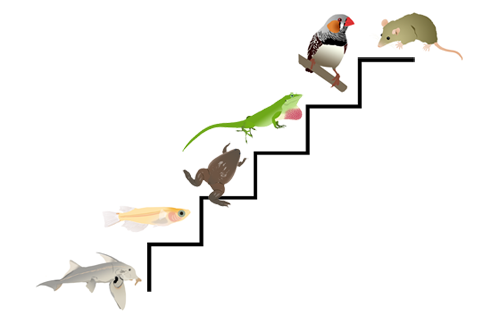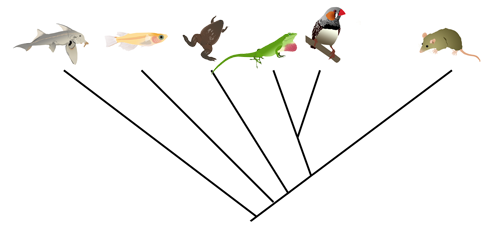If the title of this post makes you cringe, then you belong to a minority of people who realize why the phrase “highly evolved” is so wrong. Unfortunately, “highly evolved” (as an absolute term) and “more evolved” (as a comparative term) seem to be used all-too frequently. They are uttered not only by non-scientists and non-biologists but even by scientists who should know better. Even when they catch themselves after blurting out “highly evolved” in a conversation (or, more embarrassingly, in a lecture), the damage is done. Yet another Freudian (Darwinian?) slip that tells of a fundamentally bad grasp on evolution.
Go over to Byte Sized Biology and read the rest of the post quoted above. It lays out very clearly and eloquently the errors in thinking that lead people to confound increased complexity with evolutionary "progress".
I would like to add another dimension to the problem and point out a related and equally annoying error - referring to different organisms as "lower" or "higher". At the core of it lies the same error of thinking that evolution can be described a a progression, but more specifically a progression involving now living organisms. Something like a flight of stairs.

Wrong. The evolutionary "flight of stairs".
Above you see how many people sloppily think of the evolution of the jawed vertebrates, which I'm going to use as an example from now on. Fish crawled out of the sea, became amphibians, became reptiles and so on... In this scheme, fish are "lower" vertebrates and the assumption is made, quite incorrectly, that they are less complex than us mammals or "higher vertebrates". Of course, most biologists realize (I hope) that this is wrong. Any now living organism is just as "evolved" as any other, fish are just as "highly evolved" as we are, but more closely related organisms have more recent common ancestors than do less closely related organisms. This gives us the following image.

Right. The evolutionary tree.
What most biologists that say things like "highly evolved" or "lower organisms" don't realize is that every time they let that error slip, whether consciously or unconsciously, they're perpetuating the incorrect "flight of stairs" view of evolution that completely overlooks extinct forms and therefore common ancestry.
Somehow this flawed and sloppy way of thinking comes very easy and is unbelievably hard to shake. You'd be surprised at how often these devious little words "lower" and "higher" sneak their way into scientific manuscripts and lectures, even from very prominent researchers in their fields. The correct alternative to saying that fishes are "lower vertebrates", which is to say that they are an earlier diverging vertebrate lineage relative to ours, doesn't quite roll off the tongue as easily.
Then there's the fact that fish, to continue the example, have many wonderful and incredibly complex adaptations that we lack completely or that have once been more widespread but are now lost from many other lineages. Especially with regards to their endocrine and homeostatic functions. Trying to "grade" the degree of complexity between now living organisms is not only very difficult if you try, it's also misleading.
In conclusion: don't ever say "highly evolved" or "lower organisms" or I will find you and slap you with a dead fish, Monty Python style.
Swedish blog tags: Evolution, Vetenskap
Technorati tags: Evolution, Science
No comments:
Post a Comment
Note: Only a member of this blog may post a comment.